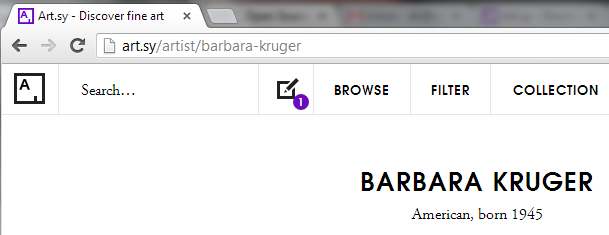All Artsy URLs shared publicly are humanly readable. For example, you’ll find all Barbara Kruger’s works at artsy.net/artist/barbara-kruger and a post by Hyperallergic entitled “Superfluous Men Can’t Get No Satisfaction” at artsy.net/hyperallergic/post/superfluous-men-cant-get-no-satisfaction. This is a lot prettier than having id=42 in the browser’s address and is a big improvement for SEO.

We construct these URLs with a gem called mongoid_slug. Interesting implementation details under the cut.
Mongoid-Slug Basics
Include the gem in Gemfile.
``` ruby Gemfile gem “mongoid_slug”, “~> 2.0.1”
The basic functionality of mongoid-slug is achieved by adding the `Mongoid::Slug` a mixin and declaring a slug.
``` ruby post.rb
class Post
include Mongoid::Document
include Mongoid::Slug
belongs_to :author, class_name: "User"
field :title, type: String
slug :title, history: true, scope: :author
field :published, type: Boolean
end
This adds a _slugs field of type Array into the Post model. Every time the title of the post changes, a new slug is generated and, depending on the value of the history option, either replaces the existing slug or appends the new slug to the array of slugs. A database index ensures that these are unique: two posts of the same title will have different slugs, such as “post-1” and “post-2”. Our example is also scoped to the author of the post.
You can now find this post by _id or slug with the same find method. And with history: true, you can find a document by any of its older slugs!
# find by ID
user.posts.find("47cc67093475061e3d95369d")
# find by slug
user.posts.find("superfluous-men-cant-get-no-satisfaction")
Mongoid-slug is smart enough to figure out whether you’re querying by a Moped::BSON::ObjectId or a slug. Performance-wise the lookup by slug is cheap: mongoid_slug ensures an index on _slugs. This all works, of course, because MongoDB builds a B-tree index atop all elements in each _slugs array.
The find method will naturally respect Mongoid’s raise_not_found_error option and either raise Mongoid::Errors::DocumentNotFound or return nil in the case the document cannot be found.
Avoiding Too Many Slugs
Users writing posts may want to edit them many times before they are published. This can potentially create a large number of unnecessary slugs. We’ve used a simple trick to generate slugs only after a post has been published by defaulting the slug of an unpublished post to its _id. Mongoid-slug will append -1 to such slugs, so we monkey-patch Mongoid::Slug::UniqueSlug with the code in this gist. Special care must be taken not to destroy a slug of a post that has been published earlier, then unpublished.
slug :title, :published, scope: :author, history: true do |p|
if p.published? || p.has_slug?
p.title.to_url
else
p.id.to_s
end
end
def has_slug?
! slug.blank? && slug != id.to_s
end
The parameters to slug include all fields that may cause the slug to change. When a post is published by setting published to true, the slug will be re-generated with a call to build_slug as long as the published field is included in that list.
Please note an interesting discussion about allowing model ids in the _slugs here.
Caching by Slug
Because slugs can now change, but lookups by old slugs should hit the cache, caching by slug makes cache invalidation difficult. A two-layered cache that maps slugs to ids and then caches objects by id can solve this at the expense of an additional cache lookup. We have yet to implement this in Garner, see #13.
International Slugs
We have a large international audience with names and posts in all kinds of languages. An escaped UTF-8 URL would be much worse than a BSON ObjectId. Fortunately, mongoid-slug uses stringex under the hood. This gem defines to_url and rewrites special symbols and transliterates strings from many languages into English. Here’re some examples of generated slugs.
"ITCZ 1 (21°17ʼ51.78”N / 89°35ʼ28.18”O / 26-04-08 / 09:00 am)".to_url
# => itcz-1-21-degrees-17-51-dot-78-n-slash-89-degrees-35-28-dot-18-o-slash-26-04-08-slash-09-00-am
"“水/火”系列 No.8".to_url
# => "shui-slash-huo-xi-lie-no-dot-8"
"трактат по теории этики".to_url
# => "traktat-po-tieorii-etiki"
Pretty amazing!
Comments